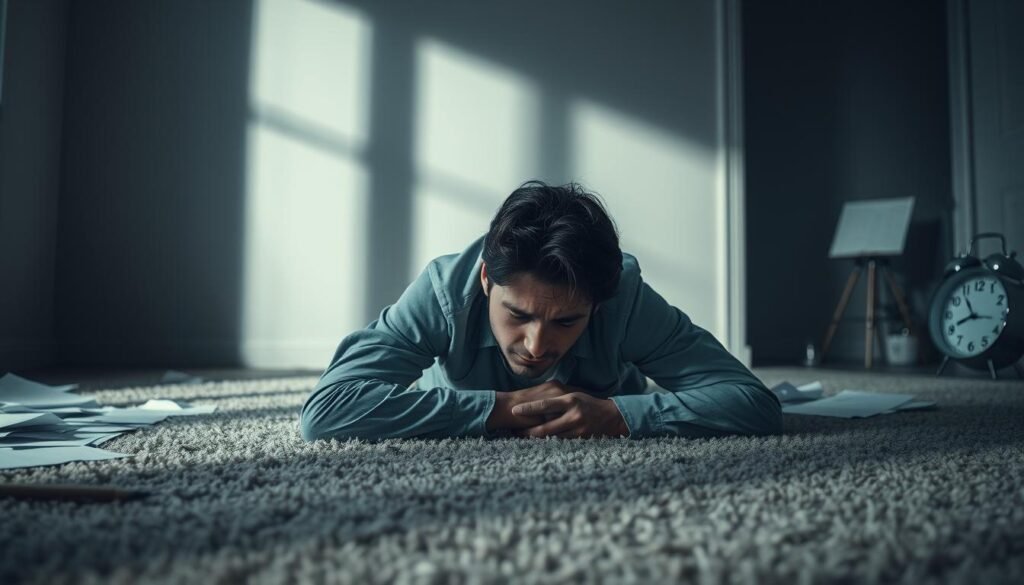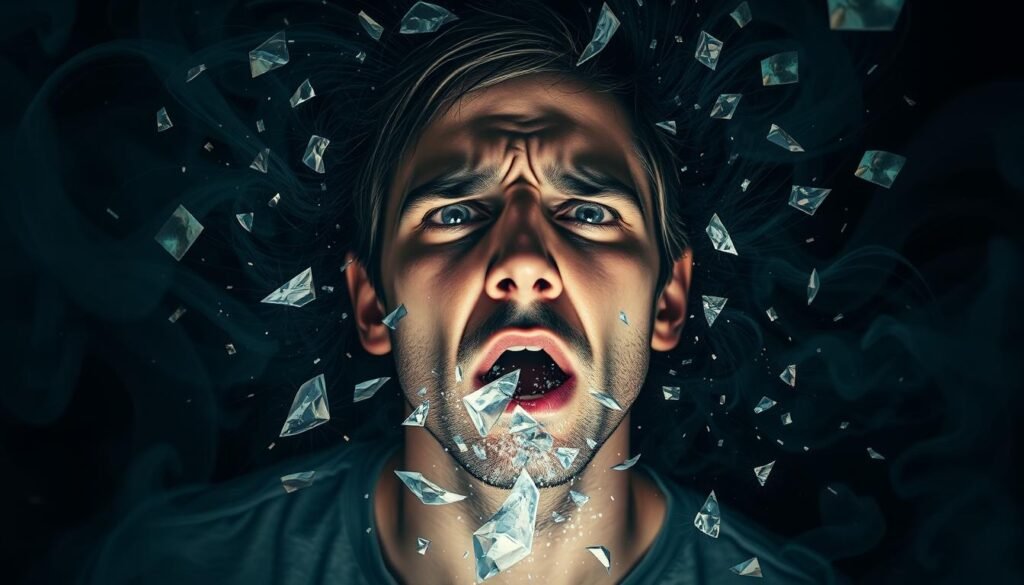Nearly 6 million adults in the United States are affected by panic attacks every year. A common fear among these individuals is the threat of passing out from anxiety. As anxiety spikes, people might feel their heart race or head spin, making them wonder: can anxiety cause you to faint? This guide explores how anxiety-induced blackouts and symptoms like dizziness and fainting are connected. It aims to help readers understand what triggers these feelings and how to deal with them.
Key Takeaways
- When anxiety is high, it can cause rapid breathing and dizziness.
- Panic attacks don’t often lead to fainting, but extreme stress may in rare events.
- Learning about and handling your anxiety can lessen episodes of feeling faint.
- Feeling lightheaded during an anxiety attack is usually due to hyperventilating.
- Using breathing methods can help calm panic attack symptoms.
Understanding Anxiety and Its Symptoms
Over 18 percent of adults in the United States face anxiety disorders each year. Symptoms include feeling nervous, having a fast heartbeat, and feeling dizzy. These signs can greatly affect someone’s mental health. Chronic anxiety not only affects the mind but can also show physical symptoms. It’s vital to know these signs for better management.
Research indicates that people with anxiety disorders have a higher chance of experiencing vertigo. This link shows how mental health issues can lead to physical problems, causing more stress. A study found that almost all vertigo patients felt anxious, from mild to severe levels.
When anxious, our bodies react physically, and stress hormones may mess with our balance. While most symptoms of anxiety are not life-threatening, ongoing dizziness or chest pains should be checked by a doctor. Knowing how anxiety and physical symptoms are connected is key to finding good treatment. This could mean taking care of both mind and body issues.
To fight anxiety, mixing lifestyle changes with professional help works best. Activities like meditation, yoga, and exercising can help calm anxiety. Getting therapy and perhaps medication can also make a big difference. For more help, check out tips on managing anxiety shakes.
Can Anxiety Cause You to Pass Out?
Anxiety can indeed lead to fainting, known as anxious syncope. This happens when there’s a lot of emotional and physical stress. People with anxiety might feel dizzy, lightheaded, or like they’re going to faint.
It’s important to know this link. This way, we can understand when anxiety might cause someone to pass out.
Examining the Link Between Anxiety and Fainting
Research shows many with anxiety may faint. Anxiety can change how blood flows in the body. This can make people faint due to anxiety.
A study in 2022 found a link between anxiety, depression, and fainting. Emotions can cause vasovagal syncope, leading to fainting. Knowing this helps us take care of our physical health too.
How Anxiety Triggers Physical Reactions
When we’re stressed, our body reacts. We might breathe too fast, feel dizzy, or even faint. This is common during panic attacks.
Even though these attacks are short, they are scary. Through controlled breathing and relaxing, we can manage anxiety better. This helps prevent fainting.

The Role of Hyperventilation in Anxiety
Hyperventilation is closely linked to anxiety, showing up as rapid, shallow breaths during stress. This over-breathing loses too much carbon dioxide, causing several symptoms. People with anxiety often see their breathing change, making things worse and keeping them in a cycle of discomfort.
Understanding the Mechanism of Hyperventilation
When someone hyperventilates, their body faces several changes, such as:
- Rapid heartbeat
- Chest pains
- Lightheadedness
- Shortness of breath
- Tingling or weakness in limbs
Half of those with panic disorder suffer from hyperventilation as a main symptom. Worrying about dizziness can make anxiety stronger, which makes breathing problems more likely. Wearing tight clothes can make this even worse, adding to the discomfort.
How Hyperventilation Leads to Feeling Faint
Hyperventilating can reduce blood flow to the brain. This can make you feel faint or even cause fainting. This is often seen with anxiety-related fainting. Sometimes, the cause of fainting isn’t found even after checks. Up to 47% of these cases could be linked to anxiety disorders. Falling from these fainting spells is common, leading to injuries in over half of the cases.
Hyperventilation-induced syncope is a key discussion point in treatments. While there’s debate around breathing therapy, some research shows it helps. A particularly noteworthy study showed that breathing retraining helped those with hyperventilation syndrome. It highlights how closely related breathing problems and anxiety are.

Anxiety-Related Dizziness and Lightheadedness
Anxiety can show itself through physical symptoms like dizziness and lightheadedness. These issues can interfere with daily activities. It’s key to know how anxiety impacts these feelings. Anxiety may lead to different kinds of dizziness, including lightheadedness or vertigo. Understanding how anxiety disorders connect with dizziness is vital for those experiencing it.
Types of Dizziness Caused by Anxiety
Living with anxiety can bring on several types of dizziness, including:
- Lightheadedness – This can feel like you’re about to faint. It might happen during or right after an anxiety attack.
- Vertigo – You might feel like everything is spinning. This is often related to severe anxiety.
- Dizziness – This general feeling of being unsteady can make concentrating or balancing tough.
When anxiety kicks in, it triggers a rush of adrenaline. This starts the fight-or-flight response, causing symptoms like nausea and numbness in hands and feet. Lightheadedness can come with these, showing how our bodies and emotions react together.
The Connection Between Dizziness and Anxiety Disorders
The link between dizziness and anxiety is complex. Anxiety can lead to dizziness without a clear reason. This can start a cycle of more fear and dizziness. Conditions like low blood pressure might make anxiety worse, causing more episodes of feeling faint.
Being in crowded places or using public transit can spike adrenaline levels. This makes feelings of dizziness and anxiety overlap. Luckily, several treatments like therapy, breathing techniques, and wellness habits are available. Addressing these symptoms early helps people manage their anxiety better.
Anxiety-Induced Syncope Explained
Anxiety-induced syncope, also known as anxious syncope, is when people faint because of intense stress. Your body might react to extreme anxiety by lowering your heart rate and blood pressure too much. When this happens, you can lose consciousness.
What is Anxiety-Induced Syncope?
Anxiety can make you briefly lose consciousness. Stressful moments can be too much for your body, leading to fainting. It’s important to understand this, especially if you tend to faint during panic attacks.
Symptoms and Recognition of Anxious Syncope
To manage anxious syncope well, you need to know the signs. Symptoms include:
- Lightheadedness or dizziness
- Visual disturbances, often described as spots or tunnel vision
- Confusion or disorientation upon regaining consciousness
- Feeling weak or excessively sweaty
Fainting usually is sudden. People around you might see jerky movements or notice your pulse is weak. Knowing these signs and understanding they’re linked to anxiety can help. It’s also important for those at risk to know what triggers their fainting. This way, they can try to avoid these triggers.

| Symptom | Description |
|---|---|
| Lightheadedness | A sensation of feeling faint or dizzy before losing consciousness. |
| Confusion | A brief state of uncertainty upon regaining consciousness. |
| Weakness | Generalized weakness, often accompanied by excessive sweating. |
| Visual Disturbances | Can include seeing spots or experiencing tunnel vision prior to fainting. |
Other Causes of Fainting from Anxiety
Anxiety doesn’t just make you feel nervous; it can also cause physical issues like fainting. It’s crucial to know the other reasons behind fainting when anxious. One main cause is vasovagal syncope, which is when you suddenly faint because your blood pressure drops quickly. People may also faint from intense fears, especially if they are scared of blood or getting hurt.
Understanding Vasovagal Syncope
Vasovagal syncope happens because of a strong emotional shock, like fear, that makes your heart rate and blood pressure fall fast. This makes you faint. Some people might faint when they see needles or blood. It’s important to know what makes you faint so you can try to avoid these things. For more information, click here to learn about causes of fainting and what they mean.
Phobias and Their Link to Fainting
Intense, irrational fears, or phobias, can push someone into feeling so anxious that they faint. Being extremely scared of seeing blood or getting injured can make your heart race and make you feel dizzy, sometimes leading to fainting. Although it’s less common, panic attacks can also make you feel so weak and lightheaded that you might think you’re going to faint. Learning how to calm down and control these fears through therapy can be really helpful.
How to Manage Anxiety-Related Fainting Episodes
Managing anxiety-related fainting includes using strategies to control hyperventilation and stay calm. Symptoms like cold skin, dizziness, and feeling light-headed are common. Knowing how to relieve anxiety helps people cope better.
Strategies to Control Hyperventilation
Hyperventilation often leads to feeling faint. There are ways to regulate breath to prevent this. Useful methods include:
- Paced breathing: Slow, deep breaths help balance oxygen in the body.
- Awareness of breath: Paying attention to breathing avoids quick breaths that cause hyperventilation.
- The Applied Tension Technique: Lars-Göran Öst’s method increases blood pressure by tensing muscles, assisting those who might faint.
Using these techniques can greatly aid in handling anxiety in tough situations.
Effective Breathing Techniques for Anxiety Relief
Adding breathing techniques to daily life is crucial for managing anxiety. When anxious, calming breathing exercises are key. Try:
- Diaphragmatic breathing: Breathe deep from the diaphragm to relax and lessen anxiety.
- Box breathing: Breathe in for four counts, hold for four, exhale for four, and hold for four to calm down.
- 4-7-8 breathing: Inhale for four counts, hold for seven, then exhale for eight counts for fast relaxation.
Regular practice of these methods builds defense against anxiety triggers and lowers fainting chances. Drinking enough water and eating well also help prevent anxiety-linked light-headedness.
For more advice on handling anxiety-related fainting, seeking professional help offers specific strategies for better health.
When to Seek Medical Help
It’s very important to know when to seek help for anxiety symptoms, like fainting. Fainting might seem scary and could come from anxiety disorders. But, serious health issues can also cause it. Things like low blood pressure, heart attacks, or strokes can lead to fainting. This is why it’s vital to check for these serious conditions first.
Potential Underlying Medical Conditions
People who faint should watch out for hidden health problems. If you faint more than once or don’t know why it’s happening, see a doctor. Look out for symptoms like being very confused after fainting, having blurry vision, or having fainting spells that seem related to your heart. A doctor can figure out if the cause is something minor, like dehydration or low blood sugar, or something more serious, like heart or brain problems.
Signs It’s Time to See a Doctor
If fainting comes with worrying symptoms, it’s time to talk to a doctor. This includes feeling weak all the time, getting dizzy from medications, or experiencing intense anxiety. Also, if dizziness lasts a long time, you should seek help. Anxiety can affect your body and mind. Knowing when to get medical advice can help manage it better and improve your life.